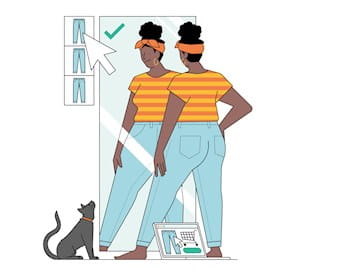Last spring, with the COVID-19 pandemic underway, entrepreneurs building some of the world’s most innovative companies were forced to hit the brakes. Many paused to conduct a triage of sorts, evaluating the pandemic’s potential impact on their business before calculating their next move.
With the economy stalling, some company founders felt the need to rethink their playbook in a big way. Others took a brief hiatus, but decided to stay the course, while also sharpening technology offerings to appeal to customers who were stuck at home.
As 2021 begins, there’s less uncertainty in the new venture space, with many venture capitalists feeling especially optimistic, said Booth professor Steve Kaplan. The Neubauer Family Distinguished Service Professor of Entrepreneurship and Finance and the Kessenich E. P. Faculty Director at the Polsky Center for Entrepreneurship and Innovation, Kaplan has witnessed an increasing number of alumni and current students adjusting to the pandemic climate and learning to use it to their collective advantage.
“Any time there is a lot of turbulence, it leads to entrepreneurship opportunities,” he said.
One area of opportunity: emerging technology. Many new ventures were forced to prioritize new digital offerings, thereby accelerating transformation in the area across a host of industries, said Kaplan. “COVID-19 has made everybody more digital,” he said. “The tech companies have found success through this.”
The VC industry—critical to entrepreneurial efforts—has also fared relatively well so far through the pandemic, added Kaplan. Kaplan was one of four researchers who sought answers from more than 1,000 venture capitalists about how their businesses were affected by the pandemic. According to the findings outlined in a September working paper, 52 percent reported being unaffected or positively affected by the pandemic. Another 38 percent were somewhat negatively affected, with only 10 percent reporting that they were severely hurt by the pandemic. Venture capitalists plan to invest at 81 percent of their normal pace in the coming year, according to the data.
For entrepreneurs still fine-tuning their game plan, Kaplan has some advice: “Be flexible and use the data that’s coming in to make sure you can react quickly.”
Meet three company founders who are taking this advice to heart and redefining their businesses in a postpandemic world.

Reimagining China’s Auto Insurance Industry
As a student in the Executive MBA Program with a background in finance, Xiaolei Cao, ’20 (EXP-25), had long sought to marry his interests in behavioral science and artificial intelligence with his entrepreneurial ambition. But it wasn’t until Cao came up with an idea targeted toward the staid auto insurance industry that he felt comfortable taking the leap.
In 2019 Cao launched UTours, an artificial intelligence–based telematics tool that allows China’s auto insurance companies to better assess risk, by providing data-driven underwriting decisions. Not only does UTours more accurately predict which clients will prove most profitable for the insurers, but it also enables insurers to actively engage customers and to improve customer lifetime value through cross-selling multiple insurance policies.
When the pandemic made in-person contact difficult if not impossible, auto insurers were suddenly vying to change their business models and build out online capabilities for policy management, renewals, and a host of day-to-day customer needs. “Digitalization became a more urgent need for our clients, and now we are here to fill in that gap,” said Cao. Indeed, UTours just signed its first large China-based auto insurer.
The company works by conducting a risk screening to better understand which 20 percent of customers tend to cause 80 percent of auto insurance claims in the country, per industry data. UTours predicts driving risk by analyzing more than 200 features, including driving environment, as well as the person’s unique risk classification and specific driving behaviors. Factoring in everything from the weather to the speed at which a driver turns corners, UTours’ A.I. model works to generate an index for every driver, making it easier to compare customers numerically. The company also uses A.I.-enabled fraud detection to eliminate fraudulent claims by more than 30 percent, added Cao.
“Digitalization became a more urgent need for our clients, and now we are here to fill in that gap.”
— Xiaolei Cao
Some of UTours’ other offerings benefit the driver too. The tool uses what’s known as nudging capabilities to help incentivize safer driving behaviors by drawing on preexisting behavioral science data. After each trip, UTours shares instant personalized feedback with drivers about the details of their driving including braking, acceleration, and even phone use. “People have biases, and most think that they drive well, but often they do not, and we’re helping them see that,” said Cao. UTours aligns the interests of insurers and the insured by improving road safety with the benefit of reducing claim costs, he added.
Launching the business while a student at Booth allowed Cao to tap into the school’s preeminent behavioral science research to help him better shape the insurtech product. Currently, Cao is working with Booth doctoral students to research new ways to promote safer driving through behavioral science. It also helped to have classmates with B2B sales backgrounds to provide needed advice. “Booth provided a great platform for problem-solving,” he said.
This spring UTours took first place at the 2020 Global New Venture Challenge (GNVC), hosted virtually by the Polsky Center. The normally in-person pitch competition had to be held online, which made building a connection with the judges more complex, Cao said. UTours competed against eight teams, and Cao’s venture won $35,000. The preparation for entering the competition ultimately proved to be the most valuable aspect of Cao’s GNVC experience. “Sometimes you lose the big picture about what you want strategically,” Cao said. “The GNVC allows you to think through that big picture.”

Reinventing the Clothes Shopping Experience
JoAnna Hartzmark, LAB ’06, MBA ’15, always knew she wasn’t the only who hated searching for well-fitting clothes. Sizing between brands wasn’t uniform—and neither was fit. Going into dressing rooms to try on the clothing she wanted to purchase was often hit or miss. After spending years at brands including Ralph Lauren and Gucci, Hartzmark was ready to take the problem into her own hands.
She spent more than a year perfecting Revelle, a personalized digital shopping platform that allows women to research and choose better-fitting clothes without leaving home. To build the algorithm driving Revelle, Hartzmark started with analyzing jeans and the different ways they fit various body types. Some pairs gaped at the back, while others were more formfitting around the waist or were cut for narrower hips. She delved into market research on how women talk about their bodies and their relationships with the clothes they wear.
For Hartzmark the key was to provide a tech-based solution for dealing with inconsistent sizing without trivializing the myriad emotional issues that clothes shopping brings up for women. Though the algorithm currently works with jeans, Hartzmark plans to add tops, dresses, bottoms, and other clothing categories as Revelle grows.
“I wanted to build a company in the tech space to add value to women’s lives—not to just get them to shop more,” she said. “We have a true focus on helping women feel beautiful and reshaping fashion’s outdated standards.”
Visitors to the platform’s website, Revelle Nation, can answer questions about their fit preferences, favorite brands, body measurements, and leisure activities. After completing the questionnaire, they get links to products. Revelle earns money through commissions from the companies included on its site.
“I thought, if we do launch during the pandemic, how do we do so thoughtfully and respectfully?”
— JoAnna Hartzmark
Hartzmark initially planned to launch during summer 2020, but as the pandemic continued, she wasn’t sure if it was really the right time. Photo shoots the company planned for the website were too risky to carry out during the pandemic. “Any imagery we needed for marketing purposes was just not there,” she said.
Hartzmark also had mixed feelings about launching a fashion tech brand during what felt like a somber moment. “I thought, if we do launch during the pandemic, how do we do so thoughtfully and respectfully, with so much chaos happening in the world?” she recalled.
Hartzmark tweaked her approach to position the launch as a pilot phase of sorts, encouraging her team to listen to Revelle’s initial users and gain an understanding of what types of features they were hoping to see moving forward. “That was the only silver lining I could find,” she said. “I could do the launch in the first phase, and have extra time to listen to my early adopters.”
Though Hartzmark studied entrepreneurship while at Booth, she wasn’t originally looking to start her own venture. Participating in the New Venture Challenge while at Booth as a cofounder of another app gave her the needed confidence to launch her own product. “Those experiences were so integral in understanding how to have these conversations and convince others that your company is worthwhile,” said Hartzmark.
These days, many of her users are seeking out Revelle as the authority on fit. As offices begin to reopen, she knows that offering women a less frustrating shopping experience for clothes that go beyond jeans will be critical. “Clothing fit is so much more complex than technically identifying a garment,” she said. “There is a huge emotional component of how women get dressed every day.”

Adding the Cool Factor to Tea
When it came to building his own brand of tea, Dmitry Klochkov, ’18 (EXP-23), had a philosophy: he wanted it to be the opposite of the stuffy brands he’d spot at his local grocery store. “Tea in general is a boring and old-fashioned industry,” he said. “The biggest innovation was about 100 years ago—when the tea bag was invented.” So he launched Offblak, “a lifestyle brand on a mission to bring innovation to tea.” It’s geared toward a youthful generation of tea drinkers Klochkov has nicknamed “Generation T.”
The company’s Instagram-friendly motto is: Good for Your Soul, Even Better for Your Following. Each tea box is small enough to fit in a mail slot for easy delivery, and the packaging has a modern-art feel with bright colors and prism-shaped tea bags. The brand’s glossy Instagram account helps too. “We wanted our products to pop,” Klochkov said.
Flavors such as It’s All Peachy (a green tea with raspberry and peach), Wild at Heart (an herbal tea with strawberry and pink pepper), and Just Dessert (a black tea with mint and chocolate) entice the hip, health-conscious consumers he’s trying to target. “We identified a big market of younger customers who lead a trendy life and care about the look, but when it comes to tea, they are still drinking their grandmother’s tea—it just doesn’t fit the puzzle,” he said. To stay true to the name Offblak, he avoided simple black tea in lieu of interesting mash-ups of flavors.
Klochkov got the idea to launch a tea brand after spending countless years on the road working in investment banking. When traveling between continents and fighting jetlag, he realized drinking coffee would make him jittery. Tea helped. “Coffee and travel typically go bad together. Tea was my personal choice and my personal trick to stay hydrated and healthy,” he said.
He spent the last quarter of his Executive MBA Program researching the brand. In 2019, nearly a year later, his former classmate JC (Jeong Cheol) Bae, ’18 (EXP-23), joined as Offblak’s COO. Klochkov’s Booth experience gave him the knowledge to launch a company. “Business school gave me confidence and the right tools to approach the founding of a business, especially without prior entrepreneurship experience,” he said.
“We concluded the terms of the deal three weeks before the UK was shut down.”
— Dmitry Klochkov
The pandemic hit just as the company started to expand globally—and Klochkov had to change his game plan. Despite the fact that more people were now home sipping tea, many of the specialty and health stores that Offblak wanted to expand into were shut down or operating with much less foot traffic, including London’s iconic Harrods department store. Placing a new brand on the shelf felt like a gamble with fewer people leaving the house. Using the slowing hospitality industry to grow the brand was also no longer an option. Instead, the team focused on online sales by offering a monthly subscription service for tea directly from the website, as well as international expansion outside of the United Kingdom.
As Offblak grows, introductions have come by way of Booth. A China-based Booth graduate introduced Klochkov to a connection at Alibaba. Klochkov later flew to the shopping giant’s headquarters in Hangzhou, China, for a meeting, which helped get his product on the site. The Booth network also helped him expand into South Korea, the Philippines, and the US market. In the United States, Offblak closed a seed round of investment and signed with Pharmapacks, the largest beauty and health seller on Amazon, to enter the US market earlier this year. “We literally concluded the terms of the deal three weeks before the UK was shutdown by the pandemic,” he recalled.
As people continue to spend the bulk of their time at home and turn to shopping online for items they once bought in person, sales have scaled up quickly. Currently, most of the sales come from customers who are purchasing tea subscriptions or gifts for others. The company recently sold out of an advent calendar–themed holiday tea box well before December. “Our sales doubled and tripled overnight simply because we were in these right channels,” he said.
For Klochkov and the others, moving
forward in uncertain times leaves plenty of
room for innovation. For now, building up
digital offerings to get ahead feels like a step in the right direction.


